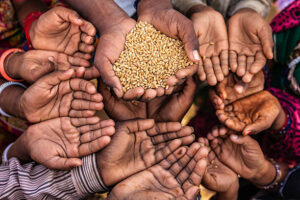Poverty is like punishment

Poverty is the state in which a family’s essential needs—such as food, shelter, clothes, and education—are not met. Other issues like inadequate literacy, unemployment, starvation, etc. can result from it. A person who is impoverished is unable to pursue education due to a lack of resources, which prevents them from finding a job. When a father is unable to give his family enough food that is also nutritious, the family’s health deteriorates. Someone who is weak lacks the motivation to finish the task. A jobless individual merely continues to be impoverished. As a result, we might assert that poverty is the underlying cause of other issues.
- In what way poverty is measured.
The United Nations has developed two metrics of poverty: absolute poverty and relative poverty. In developing nations like India, the measure of poverty is absolute poverty. In industrialised nations like the USA, relative poverty is the standard method for measuring poverty. A poverty line has been established based on the absolute minimal level of income, and it is referred to as such. A family is considered poor or living below the poverty line if its daily income falls below this amount. A family is considered to be non-poor or above the poverty line if its daily income exceeds this amount. The new poverty threshold in India is Rs 32 for rural areas and Rs 47 for urban areas.
- The causes of Poverty.
The main cause of poverty, despite the fact that there are other variables, is population. Resources and financial resources of nations are being strained by population expansion. Governments are having difficulty housing, providing for, and finding work for the expanding population.
Lack of education, conflict, natural disasters, a lack of jobs, poor infrastructure, political upheaval, etc. are additional reasons. For instance, when job opportunities are few, an individual loses his job, is unable to produce enough money to meet his family’s essential needs, and sinks into poverty. An uneducated person must choose lesser paying jobs, which makes him poorer. Lack of infrastructure results in a lack of businesses, banks, etc., which limits employment opportunities. Natural disasters like floods and earthquakes can make poverty worse.
- The effects of Poverty.
A poor family feels the impact of their situation. The inability of the poor to consume nutritious food and nutrition has an impact on their capacity to work. Due to his decreased capacity to work, he gets poorer. Children from low-income families are never given enough to eat or learn. Due to the fact that they must work to support their family, their childhood is wrecked. Some of them may even have committed robberies, murders, or thefts. Being ignorant and poor forces a person to live in unclean conditions in slums. Due to the poor quality of the drinking water and restrooms in slums, he frequently falls sick and sees a decline in his health. Usually, a person who is penniless dies young. Therefore, all societal issues are caused by poverty.
- Some measures to control the Poverty.
1.) The corruption must be removed.
2.) Unemployed people must provide suitable employment.
3.) The population will need to stop expanding.
4.) Farmers must be provided with the necessary resources for farming.
5.) Students must receive a quality education.
{CONCLUSION}
Poverty is a widespread issue that affects the entire country. It needs to be resolved as soon as possible by using some efficient techniques. Ending corruption should bring people together. He has a problem because he doesn’t comprehend even the fundamentals. Because of this, numerous initiatives are being undertaken at the moment to combat poverty and raise the standard of living for people all over the world.